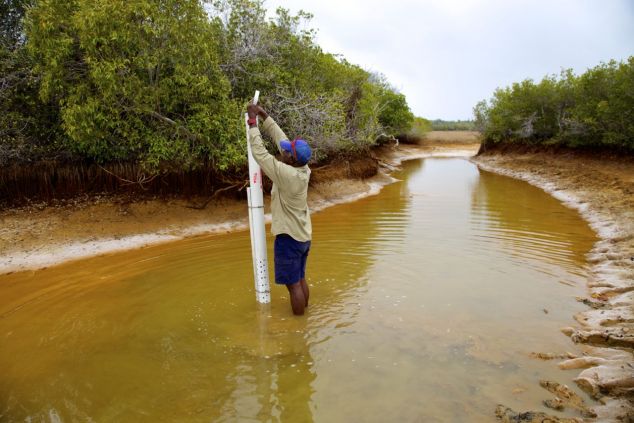JCU and rangers track climate change
James Cook University scientists and Land and Sea Rangers from the Torres Strait Regional Authority (TSRA) have installed scientific instruments to measure the impact of climate change in Australia’s northern-most islands.
TSRA and JCU staff have deployed water monitoring equipment to measure the intrusion of sea water across the wetland swamps on Boigu and Saibai islands in the Torres Strait.

The rate of sea level rise around Saibai and Boigu is predicted to be twice the global average. The impacts of climate change in this region will be particularly harshly felt, with the islands being only a few metres above sea level. Freshwater wetlands on these islands are at risk as the wet season and summer king tides approach.
“A concern here is sea level rise, and the potential intrusion of saltwater into freshwater swamps,” said Senior Ranger Dimas Toby, “which will mean the loss of freshwater fish, turtles and potentially important feeding areas for migratory birds that visit our islands. Rangers will continue to maintain these loggers for many more years, collecting important data to manage our land under climate change.”
Ranger Herbert Warasum said his people have a strong connection with the swamps. “The swamps provide us with food, like Batha (barramundi), Yamu (tarpon) and Pakawiya (sea mullet). Working with the scientists, we are combining our traditional ecological knowledge with western science to understand more about our land. This means we can protect the land for our children and their children.”
Dr Nathan Waltham, Senior Scientist at JCU’s TropWATER said the islands rise only a few metres above the highest tides. “This means productive mangrove and freshwater swamps that provide habitat for fish and crustaceans, as well as food for local communities, are at risk.
“This is a particular concern for Saibai Island, where freshwater swamps that are home to freshwater turtles and fish, which probably have genetic lineage to PNG from times of lower sea level, are at risk of saltwater intrusion under future climate change.”
Dr Waltham said that with the deployment of water quality testing equipment, rangers will be able to track salinity, water temperature and depth of water across swamp lands.
The equipment will remain in place across the wet season and its information downloaded early next year when the wetlands again recede.
Researchers are also concerned that as the freshwater wetlands become increasingly brackish from sea-level rise, opportunistic and highly adaptive invasive species, such as the climbing perch may take hold.
The wetlands of the Torres Strait are the ecosystems at most risk from climate change and sea level rise. Understanding how the pending king tides over the summer are having an impact on these systems will help rangers and the community develop adaptive management strategies to protect them.
*

































Ask A Question
Ask us about your program of interest, or if you have a question about our services.
CONTACT US TODAY